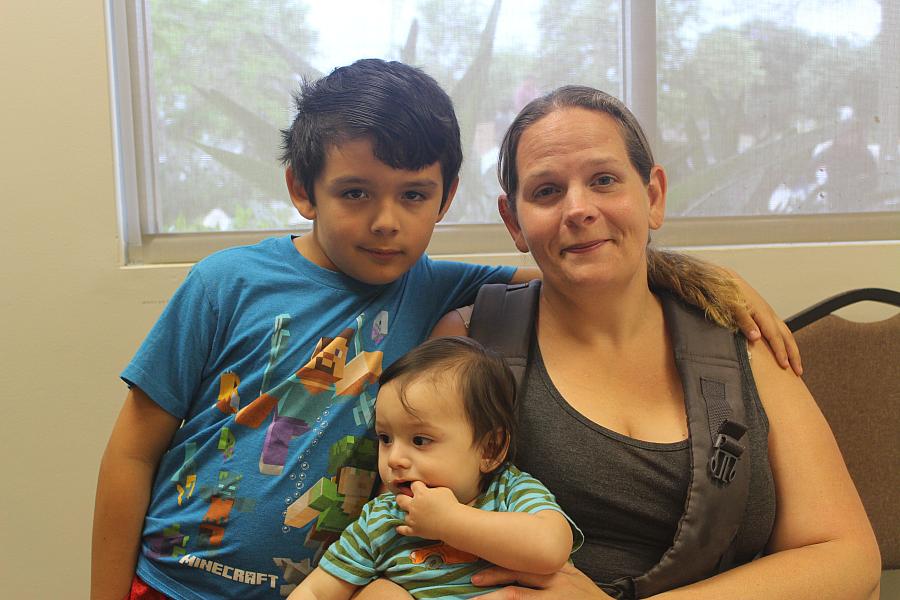What I learned investigating the nation’s diaper dilemma

Jasmine Calderon and her two kids visit the Delhi Center in Santa Ana, California periodically to get food for the family.
(Photo by Hoda Emam)
Earlier this year, as a Center for Health Journalism California Health Equity Fellow, I reported on diaper inequity across the U.S. for the Harvard Public Health Magazine. I aimed to understand the barriers to diaper access and the effects on a child's growth and development. I spoke with diaper bank representatives all over the country.
The biggest takeaway for me was the emotional and mental impact on caregivers who must make tough decisions about which basic need they should prioritize and can afford on any given day.
For the project, I traveled up and down the southern part of California conducting in-person interviews. I felt immensely honored to have parents share an intimate view of the ramifications of limited diaper access. Their stories only solidified my sense of why reporting on this issue is so important.
As a freelance reporter I often reach out to organizations and ask for their help in finding individuals to interview. Never had I met with so much eagerness than when I covered this story. The world of diaper need seems insular and isolated for those inside it, whether a volunteer, front-line staff, case worker or parent. I have found that when a reporter wants to shine a spotlight on an issue that doesn’t get the attention it deserves, many people want to share their insight.
One of the biggest challenges I encountered on the road was that I didn’t map out the locations and people I wanted to visit. I didn’t want to miss an opportunity so when anyone offered their time, I took it. In hindsight, I should have created a map and a plan of where to go and whom to see, to use my time and resources most effectively.
As I moved forward with my project, my scope continued to grow. There are so many layers to equal access to diapers and I wanted to cover it all. My senior fellow was instrumental in helping me narrow my focus.
Here are some tips for journalists looking to cover diaper access:
Start by contacting the National Diaper Bank Network. The organization was pivotal in helping me connect with lawmakers and diaper banks in various states, and it has access to a wealth of data.
Meet parents where they are; caregivers are very busy. Go to the churches and community centers where parents gather and spend time getting to know the staff. When they see your passion and interest, they will likely go the extra mile to introduce you to individuals in the community who have a story to share.
Be patient. You will get a lot of “no’s” when it comes to interviews. Many parents told me that even though they were trying their best to provide for their family, not having regular access to diapers weighed heavily on them. It’s an extremely sensitive topic for parents and so, understandably, many were not comfortable about sharing their story publicly.
Stay organized! When I was on the road reporting, I organized all my audio/notes before I headed home. I also had all my audio transcribed (Otter.ai is a lifesaver) so that back home I could access my resources easily.
Network with people involved in the issue. The individuals doing the tireless work of raising awareness about diaper access are thrilled to help a reporter connect with sources. Why? Because diaper equity is not covered as much as it should be. Ask if they have sources or know of people you can speak with. They are incredible facilitators.
Include diverse voices. I am a passionate advocate of inclusion within journalism, so I had to ensure that my article had diverse voices. I wanted to make sure that readers did not walk away with the mistaken impression that the problem is community-specific; for example, strictly a BIPOC issue or one that affects only refugees.
For years, I had been wanting to make the shift to community innovation and health equity. However, I lacked the support to make the leap. The USC Center for Health Journalism fellowship has given me the support system I have needed.
I remember Jackie Stenson, manager of projects at the Center, saying, “This fellowship has the potential to open many new doors for you.” And it has indeed.
My experience as a California Health Equity Fellowship grantee was so incredible that when my senior fellow, Dympna Ugwu-Oju, suggested I apply for yet another fellowship through the USC Center for Health Journalism, I jumped at the opportunity.
I am currently a Data Fellow reporting on food inequity for the Chicago Sun-Times. To get a better understanding of barriers to food access,I am working with the U.S. Department of Agriculture and other agencies and organizations to source raw data and connect with researchers.
This fellowship opportunity has not only further bound me to my fierce passion for journalism, but also will likely change the trajectory of my career.

